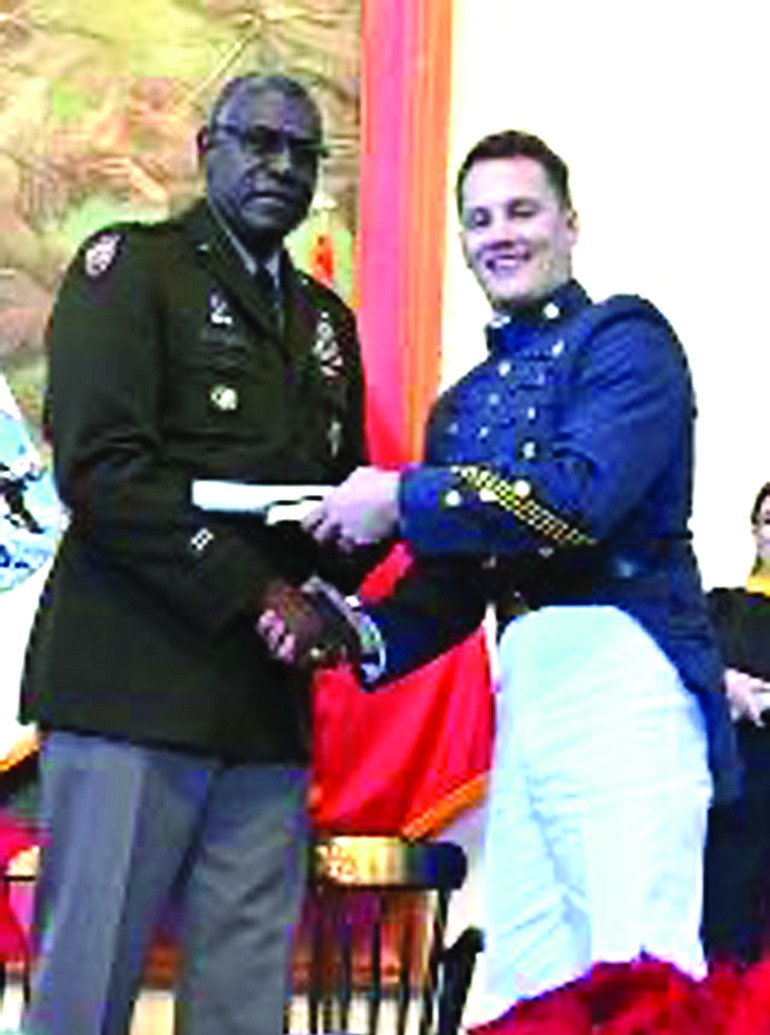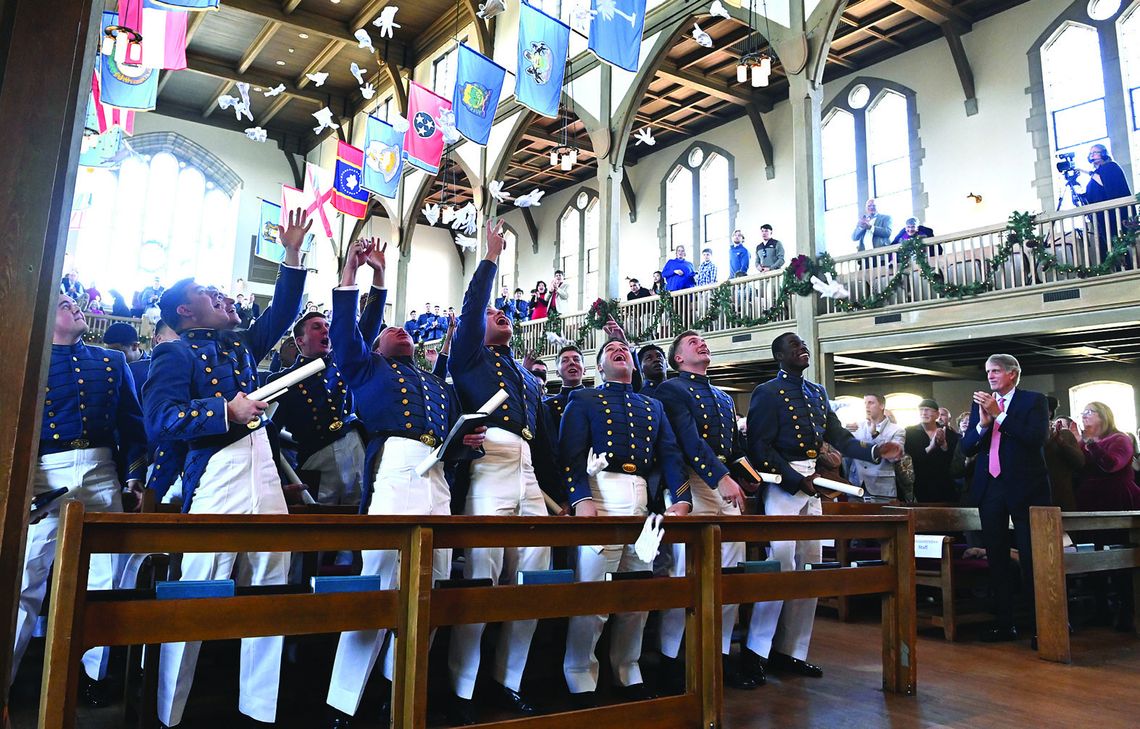101st Airborne Commander Addresses VMI’s December Graduates
Editor’s note: The following story was written by Marianne Hause, media relations specialist, VMI Communications and Marketing.
A seasonally cool morning warmed into a day full of happiness and celebration in a crowded Memorial Hall at Virginia Military Institute, as families and friends gathered to witness 38 cadets cross the stage to receive their diplomas during the commencement ceremony Dec. 19.
Maj. Gen. Cedric T. Wins ’85, superintendent, welcomed the assembly and congratulated the graduates on their persistence in completing the arduous, demanding journey of earning an academic degree from VMI.
He reminded them of the values they learned on post: honor, selfdiscipline, courage, selfless service, resilience, and excellence, and how those values will serve them well for the rest of their lives. Wins charged the graduates to thank their family members and friends who encouraged them during their time at VMI, and asked them to stay in touch and return as often as they can to support the Institute.
Wins then introduced the keynote speaker, Maj. Gen. James “Pat” Work, commanding general for the 82nd Airborne Division.
Work offered the graduates a few simple perspectives on leadership that he has discovered during his 29 years of soldiering. All the insights begin with the letter “E,” the first being energy. “Leadership requires energy. On this day in 1776, Thomas Paine channeled the energy of the colonies when he published the essay, ‘The American Crisis,’ which contained the line, ‘These are the times that try men’s souls.’ Just a short week later, General Washington inspired his flagging troops to cross the Delaware at night. It was leaders like Paine and Washington, and their ability to energize that kept the American project alive.”
Work’s second insight was encouragement. “Indeed, iron sharpens iron. Everybody with a pulse needs encouragement. The term encouragement literally means to fill with courage or to share courage. You have encouraged each other. Never forget that courage is contagious.”
Expectations was the third insight Work discussed. “I’m blessed to be the 53rd commander general of America’s first airborne division, and it’s in this role that I stand on the shoulders of warrior giants, and I stand shoulder to shoulder with our young paratroopers. We have standards or expectations for our leaders. The most fundamental questions you can consistently ask yourself in the coming years might be, what am I trying to do? Whose am I? Who am I, and what are my expectations of my life? Keep expectations of your life high.”
The next insight was effort. “Effort is a choice.” Work quoted Angela Duckworth, Ph.D., who said, “Effort counts twice on the road from talent to achievement. Our skills improve when we invest effort. Effort turns skill into achievement.”
When speaking of the insight of endurance, Work invoked VMI’s most famous graduate and one of the nation’s most influential public servants who never ran for elected office, Gen. George C. Marshall Jr., VMI class of 1901. “Marshall spent 15 years as a lieutenant, and finally promoted to captain in 1917 as America entered the Great War. His life epitomized endurance. On the same day Nazi Germany invaded Poland, Pershing’s favorite lieutenant assumed duties as Army chief of staff. He went on to be secretary of state, president of American Red Cross, and eventually secretary of defense. His was a story of remarkable endurance. He kept grinding in his craft, and when the nation called, he was ready time and again.”
When he entered the Army as an infantry officer, Work was committed to developing his expertise, the next “E” in the series. “We spend most of our days preparing for a few moments of combat, but when it happens, it’s straightforward. Real people in the real world follow real experts. I’m still deadly serious about expertise, and I still know that I’ll never be good enough. No matter what you choose to do, choose to do it well. Expertise matters.
“Leaders must set an example,” he continued. “We can choose to set an example and accept that others want inspiration just like we do. I hope you choose your examples wisely. As an Army paratrooper, I live by what might be called the golden rule of airborne leadership, ‘Leaders are first in the paratroop door and last in the chow room.’
“Edge matters in a rough and tumble world. After numerous combat deployments, I’ve seen hard days and edge is the shock absorber. Edge can be powerful. Don’t apologize for it, just control it. It’s up to us to persist on the hard days, and to resist temptation and self-doubt by being prepared. As you depart these hallowed halls, continue to hone the edge you have developed here.”
Work stated that at this point in his life’s journey, largely colored by his roles as husband, father, friend and soldier, his philosophy is profoundly simple, to demonstrate empathy for others. “We can be confident and caring at the same time. Be intentional about your work, to understand others, to connect with others, and to put yourself in others’ shoes, even if people don’t care for it. Life’s a team sport. Be an empathetic teammate.” The presentation of candidates for degrees was delivered by Brig. Gen. Robert W. Moreschi, dean of the faculty and deputy superintendent for academics, followed by a standing ovation and the traditional tossing of the gloves.
The commencement ceremony was livestreamed and may be viewed through VMI’s website, www.vmi.edu.
The evening before commencement, the commissioning ceremony was held in Memorial Hall, where two graduating cadets, Jarrett Taylor Herndon ’24 and Joseph Matthew Slezak ’24, commissioned into the U.S. Army as second lieutenants. Offering remarks and administering the oath of office was Col. Joe Hansen, professor of military science at VMI’s Army ROTC unit.

LUKE MAYR, an economics and business major from Fairfield, receives his diploma from Maj. Gen. Cedric T. Wins ’85. (VMI photo by Kelly Nye)



